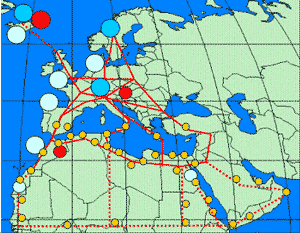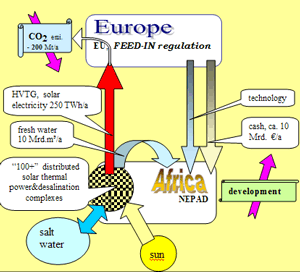Solarenergie für Afrika
Konferenz in Düsseldorf vom 4.-6. September 2003
Development in Africa through Clean Power for Europe
An European-African wind and solar energy project for Global climate stabilisation, African development and good neighbourhood
Gerhard Knies
Development of humankind has reached a point, where stability of living conditions requires a rapid transition from free expansion to controlled balance in the use of limited natural resources. Simultaneously with this turning point to sustainability of human evolution, humankind has to cope with the transition from independent peoples to an integrated world (globalisation). The traditional principles of independence and autonomy of nations need to be replaced by the principles of global welfare and co-operation, and security of human living conditions must be given priority over the rule of market.
The European-African project proposed here could bring a big step towards a stable, sustainable and co-operative world. If the highly developed Europe would decide to buy a substantial volume of its energy as solar and wind electricity from the less developed countries in North Africa instead of fossil fuels, then Europe and Africa could jointly
- reduce the excessive and dangerous CO2 emissions of Europe, fast and at low cost
- curb climate change hazards like desertification in North-Africa
- boost development in Africa, if a large fraction of solar and wind technology is produced there
- convert the Mediterranean from a divide between 2 incompatible worlds into a link between co-operating partners and good neighbours.
The salient features of the proposed Euro-Afro project are illustrated in the 2 figures below.
 |
Development in Africa thru Clean Power for Europe (EU - NEPAD) Project
 solar thermal complex for power & desalination in cogeneration and for settlement development. Solar heat storage for day/night op. solar thermal complex for power & desalination in cogeneration and for settlement development. Solar heat storage for day/night op.
 wind, wind,
 hydro, hydro,
 geothermal geothermal
 High voltage direct current transmission grid (HVTG) = Infrastructure for Sustainability High voltage direct current transmission grid (HVTG) = Infrastructure for Sustainability |
- Clean power for Europe
- Fresh water for Africa
- Production of collectors in Africa
- Power Transmission losses Africa -Europe < 15%
Wind and solar energy potentials in Africa are superior to the European ones in intensity (by factor 2-3) and in extension (for solar by factor > 100). They combine very well since the important European source of wind is strong in winter, and sun and wind in North-Africa are stronger in summer. The dynamic development of wind technology over the past 20 years in Europe, could be repeated for solar technology if applied in Africa. Wind and solar technology located in North Africa is already nearly competitive with fossil fuels.
An Euro-Afro solar power co-operation could turn the presently conflicting goals of climate protection and economic development into mutual supporters, by making clean energy production in Africa for local and European demands to a motor of industrial and socio-economic development in Africa. Africa could take advantage of its superior solar and wind resources to generate clean electricity as a competitive industrial product for export to the European market. The developmental gap between Europe and Africa could be reduced.
The technology of solar steam production for power plants, by concentrating collectors like parabolic trough or linear Fresnel collectors, can be used in all arid or desert regions of the world, which automatically offer also the space for their deployment. After cost reduction to fossil fuel level, as achievable in the Euro-Afro project, concentrating solar collectors could be used to produce clean power also for North and South America, North and South Africa, India, China and Australia, i.e. for more than 90% of world population. Thus this technology could make a significant contribution to global climate stabilisation in due time, and to socio-economic development by replacing the pumping of oil by the more labour intensive construction of collectors. These goals could be achieved within 2-3 decades, if pursued with determination by the global community.
The initial financial support is estimated to be in the order of 2 - 5 billion (109) Euro, spread over a period of about 10 years. This is expected to be sufficient to reach break-even with oil at around 25$/bbl. Solar electricity costs will then continue to fall, leading to substantial savings in energy bills.
Development in Africa thru Clean Power for Europe (EU - NEPAD) Project
- African wind & solar power for export to Europe, and for local demand
- water desalination for Africa
- hundreds of distributed power&desalination plants
- interconnecting HVTG
- component production in Africa
- industrial & socioeconomic development in Africa,
- faster climate stabilisation
The volume of 250 TWh/a assumed here is close to 10% of EU annual electricity consumption. This value can be reached within 20 years.
The key elements of this project
- Clean electricity for Europe and desalinated water for Africa in co-generation. With the already established technologies for wind turbines and for solar thermal power plants, power could be generated in North Africa from wind and sun at significantly lower costs than in Europe. Together with 10% of EU electricity (250 TWh), about 10 billion m³ of water can be desalinated per year.
- A modern, low loss and low cost high voltage direct current power transmission grid (HVTG) across the Mediterranean, best as a public contribution to infrastructure for global sustainability. It would connect the best solar and wind regions of the world with the European power market. Spain and Morocco are already connected by the first HVTG sea-cables.
- Cost reduction: Installation of capacities of about 50 GW for the local and for about 10% of European demand could be achieved in about 15 years. Already within 10 years solar power could become cost competitive with electricity produced from oil at prices around 25$ per barrel.
- An EU feed-in act for clean power including imports from Africa would ensure private investment into the project during the cost reduction phase until break-even with fossil fuels has been reached.
- African-European co-operation to develop African engineering and production capacities.
- After cost reduction the technology will become beneficial also for Sub-Saharan Africa.
- To generate more political stability and good neighbourhood between Africa and Europe.
The proposed project is in direct support of 2 out of the 8 development goals announced for the new century in the UN Millennium Declaration by the world leaders: Goal 7 (ensure environmental stability) and Goal 8 (develop a global partnership for development). Further, it is in line with the development goals for Africa as proclaimed by NEPAD, the New Partnership for African Development, and with a model project proposed by the Scientific Advisory Board on Global Change to the German government.
With support of UNEP/UNDP, the proposed European-African co-operative solar and wind energy project should be established at the level of EU and NEPAD, as additional handle to achieve real climate stabilisation within this century, and for the development in Africa.

 solar thermal complex for power & desalination in cogeneration and for settlement development. Solar heat storage for day/night op.
solar thermal complex for power & desalination in cogeneration and for settlement development. Solar heat storage for day/night op. wind,
wind, hydro,
hydro, geothermal
geothermal High voltage direct current transmission grid (HVTG) = Infrastructure for Sustainability
High voltage direct current transmission grid (HVTG) = Infrastructure for Sustainability 